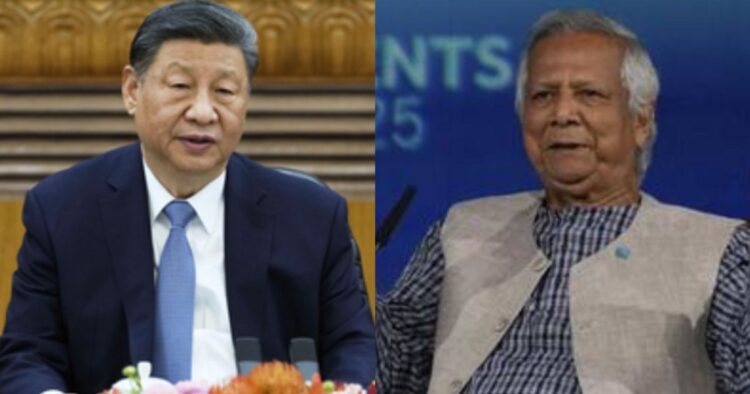Chinese President Xi Jinping met with Bangladesh’s Chief Adviser Muhammad Yunus on Friday, according to official news reports, raising serious concerns for India amid its frosty ties with Dhaka. Yunus is on a four-day visit to China.
He first attended the Boao Forum for Asia Annual Conference in Hainan following his arrival in China on Wednesday. On Thursday, he went to Beijing, where he was welcomed by Chinese Vice Foreign Minister Sun Weidong at the airport.
China – Bangladesh’s Growing Camaraderie
Before his meeting with Xi, Yunus had asked China to lower interest rates on loans and to remove commitment fees for Chinese-funded projects in Bangladesh. In a meeting with China’s Executive Vice Premier Ding Xuexiang at the Boao Forum, Yunus also requested support for various development projects in Bangladesh.
He asked for interest rates on Chinese loans to be reduced from 3% to 1-2% and for China to waive fees on some projects in Bangladesh. China is Bangladesh’s fourth-largest lender, after Japan, the World Bank, and the Asian Development Bank. Since 1975, China has provided Bangladesh with loans totaling USD 7.5 billion.
In his meeting with Ding, Yunus also requested China’s help in moving some of its manufacturing industries, like those for clothing, electric vehicles, electronics, and solar panels, to Bangladesh.
At the forum, Yunus also met with Russian Deputy Prime Minister Alexey Overchuk, who said Russia wanted to export more wheat and fertilizer to Bangladesh. They also talked about the Russia-funded Rooppur Nuclear Power Plant in Bangladesh.
Additionally, Yunus met with former UN Secretary-General Ban Ki-moon, who is the Chairman of the Boao Forum, and asked for advice on helping Bangladesh transition smoothly to democracy.
India and Bangladesh share 54 rivers that flow from the Himalayas to the Bay of Bengal. The Ganga and Brahmaputra rivers (called Jamuna in Bangladesh) are the largest ones they share. The Teesta River, a tributary of the Brahmaputra, flows from Sikkim and West Bengal into Bangladesh.
China is interested in the Teesta River and has proposed to dig and build embankments along part of it. However, Bangladesh has not yet agreed to this plan.
Why Will India be Watching?
India’s relationship with Bangladesh has become tense since August 2024, when Bangladesh’s former Prime Minister, Sheikh Hasina, was removed from power. After her removal, India gave her refuge, and Bangladesh has asked India to send her back, but India has refused.
Tensions have increased due to concerns about violence against Hindu minorities in Bangladesh, as well as a rise in refugees coming to India. Extremists who belong to the Bangladesh Nationalist Party (BNP) vandalised the house of a Hindu family on 18th March and issued death threats to them in Sylhet city of Bangladesh.
2,200 cases of violence against Hindus and other minorities in Bangladesh were reported till 8th December 2024 and 112 cases in Pakistan were reported till October 2024. Idols of Goddess Durga and other Hindu deities were vandalised at the Rishipara Barwari Puja Mandap and the Manikadi Palpara Barwari Pujamandap on 28th September and 1st October respectively.
A report has been released by the Bangladesh Hindu Buddhist Christian Oikya Parishad about the 205 instances of attacks on minority community members especially Hindus in the country’s 52 districts following Prime Minister Sheikh Hasina’s departure on 5th August.
In response, India has reduced the number of medical visas it gives to Bangladeshi citizens. Meanwhile, China has stepped in to help Bangladesh. A medical team from Bangladesh recently visited China’s city of Kunming to discuss setting up hospitals there for Bangladeshi patients.
Despite these issues, India has tried to improve ties with Bangladesh. The Indian High Commissioner to Bangladesh, Pranay Kumar Verma, has met with key officials from Bangladesh’s government, and Foreign Secretary Misri visited Dhaka to hold talks with Bangladesh’s Foreign Secretary.
While India and Bangladesh’s relationship has been strained, China has been trying to build a stronger connection with Bangladesh, focusing on trade, defense, investment, and other areas.

















Comments